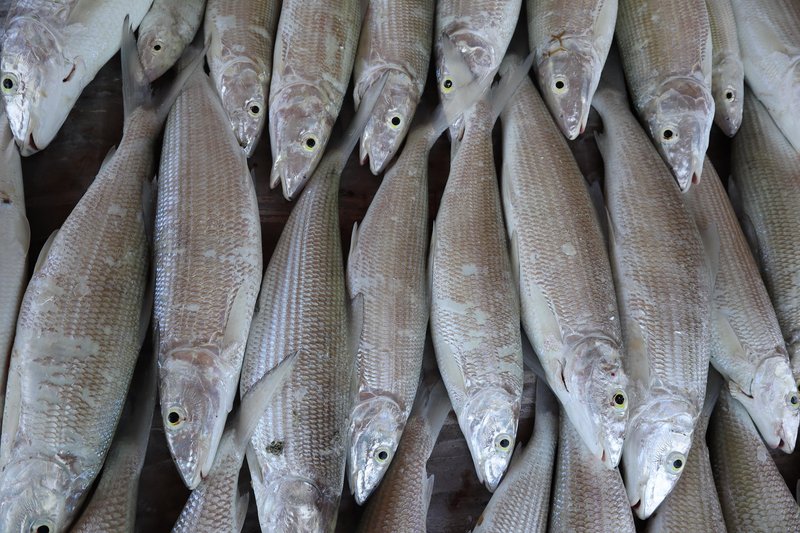Oct Webinar: Topics at the nexus of climate change, fisheries & blue foods
11 AM–12 PM | Online | PublicA webinar series highlighting the impact of climate change on fisheries, aquaculture, and the communities who depend on them.

October 2024 Webinar: Sustainable blue food systems in a changing climate
Jointly hosted by the UN Ocean Decade Programs Blue Food Futures, Fisheries Strategies for Changing Oceans and Resilient Ecosystems (FishSCORE), Sustainability, Predictability, and Resilience of Marine Ecosystems (SUPREME), Sustainability of Marine Ecosystems through Global Knowledge Networks (SmartNet), and Fisheries and Marine Ecosystem Model Intercomparison Project (FishMIP) and endorsed project Basin Scale Events and Coastal Impacts (BECI).
This webinar series highlights current efforts and challenges at the climate-fisheries nexus. Presentations and discussions will range from data-driven efforts to better understand oceanographic and biological changes affecting fisheries, to how the results can be used to inform fisheries management, aquaculture, and sustainable food decisions, to the many ways people and broader communities are being impacted by and adapting to changes in marine ecosystems and marine resource use.
Presentation 1: The influence of non-state actors on the blue food system policies in the context of Small-Scale Fisheries in the Western Mediterranean Sea
Karina M. Higa will present the pivotal role of non-state actors, particularly environmental NGOs, in shaping policies that protect and promote the small-scale fisheries (SSF) sector within the blue food system in the Western Mediterranean Sea. By analyzing gaps in EU fisheries governance, her study emphasizes how non-state actors act as informal policymakers, championing more democratic and inclusive blue food systems. These organizations help to bridge the gap between small fishers and decision-makers, advocating for equitable access to marine resources and greater representation for SSF. Their efforts underscore the critical need for stronger political engagement within ocean governance, placing ocean professionals at the forefront of policy changes that will sustain the blue food system and broader ocean management.
To address the gaps in policy engagement skills, particularly among Early Career Ocean Professionals (ECOPs), the Ocean Literacy for Blue Citizenship project, led by the Ocean Literacy Task Team/ECOP Programme, an endorsed UN Ocean Decade Programme, offers specialized training. This project will deliver a comprehensive training course, run awareness campaigns highlighting the importance of political engagement in ocean governance, and create opportunities for ECOPs to engage in policy-making through strategic partnerships. By enhancing ocean literacy and empowering ECOPs to take the lead in advocacy and strategic campaigns, the initiative ensures that future policies will prioritize sustainable, inclusive blue food systems. This approach nurtures a new generation of ocean leaders who can bridge the gap between science, policy, and society, driving forward efforts to restore marine ecosystems and protect the blue food system.
Webinar Presenter: Karina Higa is a Marine Ethnobiologist and Educator with a rich professional background spanning government, education, NGOs, research, and the private sector in Brazil, Australia, Japan, and Italy. She brings a transdisciplinary approach to her work, specializing in EU Fisheries, ocean governance, and policy analysis. Currently, she is developing policy tools for the implementation of the EU Nature Restoration Law (NRL) for Marine Protected Area (MPA) managers. In addition to her work in ocean advocacy, ocean literacy initiatives, and grant writing, Karina is highly skilled in multilateral cooperation, project management, and curriculum development, with expertise in facilitating events, crafting joint position papers, and revising international framework implementation plans at the science-policy interface.
Presentation 2: Integrating blue foods into national climate strategies: Enhancing nationally determined contributions and strengthening climate action
Blue foods are increasingly recognized as a priority for climate action, yet they are often overlooked in climate discussions and underfunded in mitigation and adaptation financing. Addressing climate impacts on aquatic food systems and leveraging their potential for climate action requires their integration into national climate strategies and UNFCCC processes. A recent report by the Stanford Center for Ocean Solutions, WorldFish, the Food and Agriculture Organization of the United Nations, Beijer Institute of Ecological Economics, CARE, and the Environmental Defense Fund offers policy options, potential concrete measures and targets, case study examples, and other resources for blue foods in climate solutions. The guidelines are designed for audiences working on nationally determined contributions and other climate strategies.
Webinar Presenter: Laura Anderson is the Engagement Project Manager at the Stanford Center for Ocean Solutions. Her primary focus is research and policy communication, supporting the COS team and partners in communicating research insights in policy settings. She also supports the Blue Food Futures Program. She was previously a communications associate for the Blue Food Assessment, a collaboration with the Center for Ocean Solutions and Center on Food Security and the Environment at Stanford University, the Stockholm Resilience Centre at Stockholm University, and EAT.
